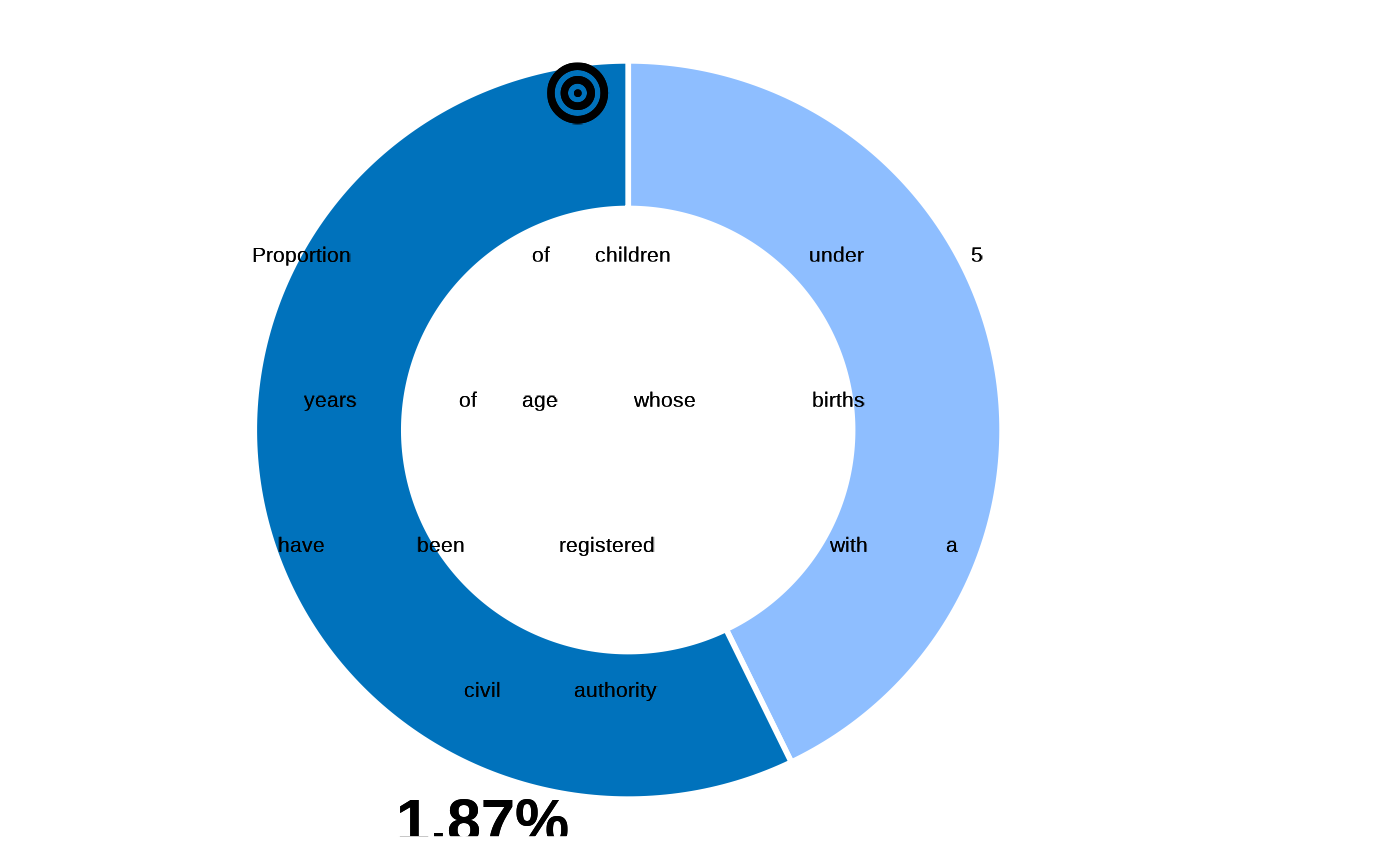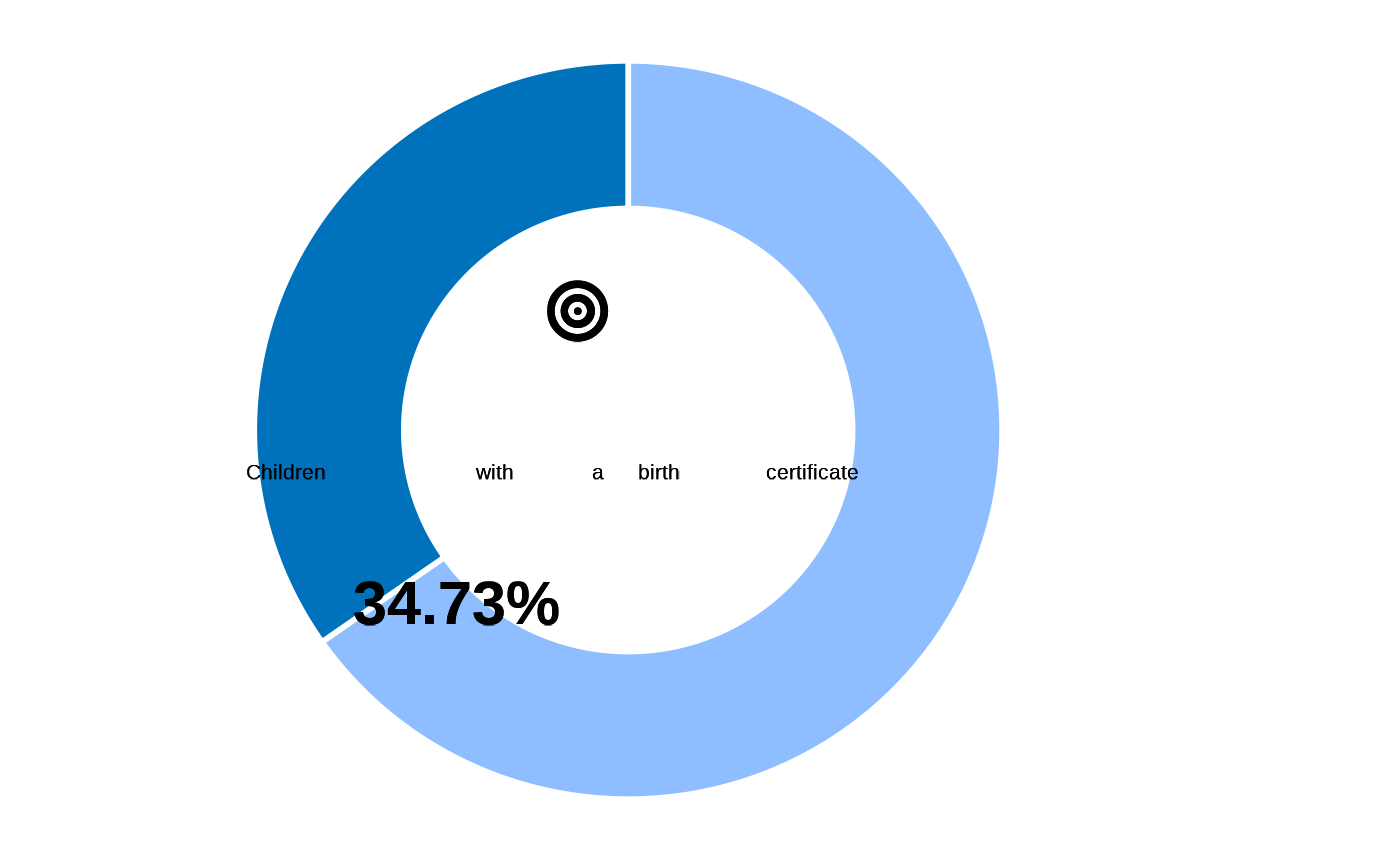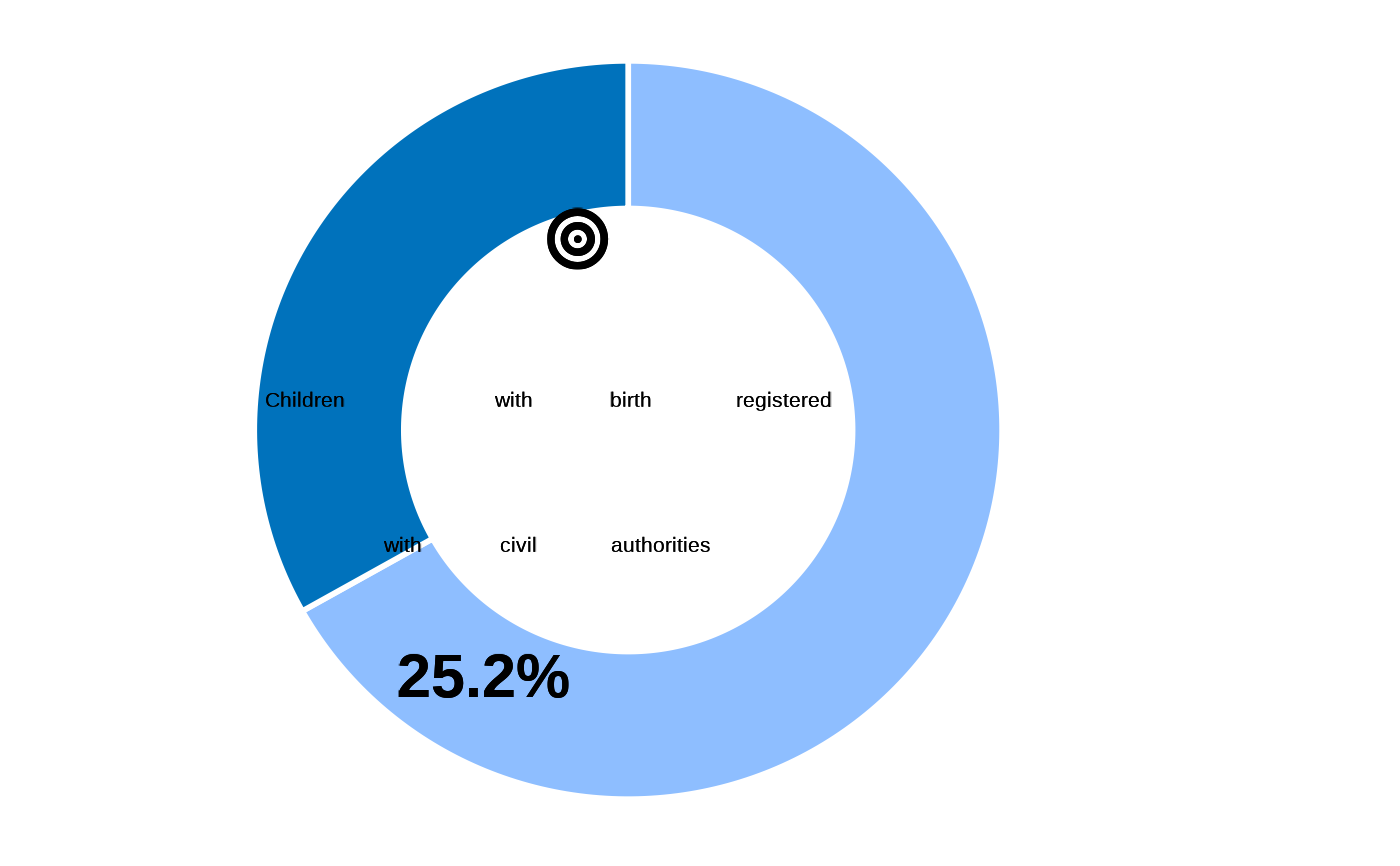Proportion of children under 5 years of age whose births have been registered with a civil authority
Arguments
- datalist
A list with all hierarchical data frame for a survey data set. format is expected to match the Excel export synchronized from kobo to RILD and loaded with kobocruncher::kobo_data()
Details
This indicator measures the proportion of children under 5 years old whose births have been registered with a civil authority and civil documentation has been issued. This is directly linked to SGD indicator 16.9.1.
The standard module for this indicator is taken from MICS and adjusted to UNHCR context.
Definitions
•Birth registration refers to the registration of new births by civil authorities and completion of the process through the issuance of a birth certificate. This also includes documents issued by UNHCR or other relevant organizations when given the authority by the State and these documents are recognized by national authorities.
Clarifications
•Birth notifications or other hospital records and records from midwives or traditional birth attendants, issued solely by UNHCR or its partners shall not be considered as birth certificates although they are important sources for establishing the total number of births. Operations are encouraged to track both the number of birth notifications and birth registrations but for the purpose of this indicator should report the number of births registered.
• The standard indicator used in DHS, MICS and RMS to report on birth registration refers to the percentage of children under age 5 (0-59 months) with a birth certificate, regardless of whether or not it was seen by the interviewer, or whose birth was reported as registered with civil authorities at the time of survey.
| Standard Questions |
|:------------------:|
| REG03 - REG04 |
**Numerator**: Number of children under 5 years old who are registered with civil authorities
**Denominator**: Total number of children under 5 years old
**Formula**: (*REG03=1 \| REG04=1) / Number of children under 5*
This indicator comes from the individual dataset
ind$REG03 - birth certificate
ind$REG04 - birth has been registeredExamples
## data, cf example fct_re_map()
datalist <- kobocruncher::kobo_data( system.file("dummy_RMS_CAPI_v2_mapped.xlsx",
package = "IndicatorCalc"))
#> Warning: Unknown or uninitialised column: `_parent_index`.
## Apply indicator function on datalist
datalist <- outcome1_2(datalist)
#> ✔ REG03
#> ✔ REG04
#> ✔ HH07
table(datalist[["ind"]]$outcome1_2, useNA = "ifany")
#>
#> 0 1 <NA>
#> 21 28 1451
table(datalist[["ind"]]$less_than_5, useNA = "ifany")
#>
#> 0 1
#> 1438 62
table(datalist[["ind"]]$HH07, useNA = "ifany")
#>
#> 0 10 11 12 13 14 15 16 17 18 19 2 20 21 22 23
#> 15 14 18 21 20 7 16 20 18 17 19 13 15 16 11 24
#> 24 25 26 27 28 29 3 30 31 32 33 34 35 36 37 38
#> 14 20 13 15 17 18 16 22 17 13 13 15 10 16 9 13
#> 39 4 40 41 42 43 44 45 46 47 48 49 5 50 51 52
#> 8 18 19 9 16 11 14 16 19 20 23 11 13 10 9 13
#> 53 54 55 56 57 58 59 6 60 61 62 63 64 65 66 67
#> 22 16 16 12 13 13 15 14 13 17 18 8 14 12 20 12
#> 68 69 7 70 71 72 73 74 75 76 77 78 79 8 80 81
#> 18 19 14 18 22 13 19 17 16 20 19 18 16 18 16 9
#> 82 83 84 85 86 87 88 89 9 90 91 92 93 94 95 <NA>
#> 19 21 18 13 12 23 12 20 18 18 11 18 23 14 12 7
barplot(as.integer(datalist[["ind"]]$HH07))
 table(datalist[["ind"]]$birthCertificate, useNA = "ifany")
#>
#> 0 1
#> 979 521
table(datalist[["ind"]]$birthRegistered, useNA = "ifany")
#>
#> 0 1 <NA>
#> 762 378 360
## Visualise value
fct_plot_indic_donut(indicator = datalist[["ind"]]$outcome1_2,
iconunicode = "f140")
table(datalist[["ind"]]$birthCertificate, useNA = "ifany")
#>
#> 0 1
#> 979 521
table(datalist[["ind"]]$birthRegistered, useNA = "ifany")
#>
#> 0 1 <NA>
#> 762 378 360
## Visualise value
fct_plot_indic_donut(indicator = datalist[["ind"]]$outcome1_2,
iconunicode = "f140")
 fct_plot_indic_donut(indicator = datalist[["ind"]]$birthCertificate,
iconunicode = "f140")
fct_plot_indic_donut(indicator = datalist[["ind"]]$birthCertificate,
iconunicode = "f140")
 fct_plot_indic_donut(indicator = datalist[["ind"]]$birthRegistered,
iconunicode = "f140")
fct_plot_indic_donut(indicator = datalist[["ind"]]$birthRegistered,
iconunicode = "f140")
